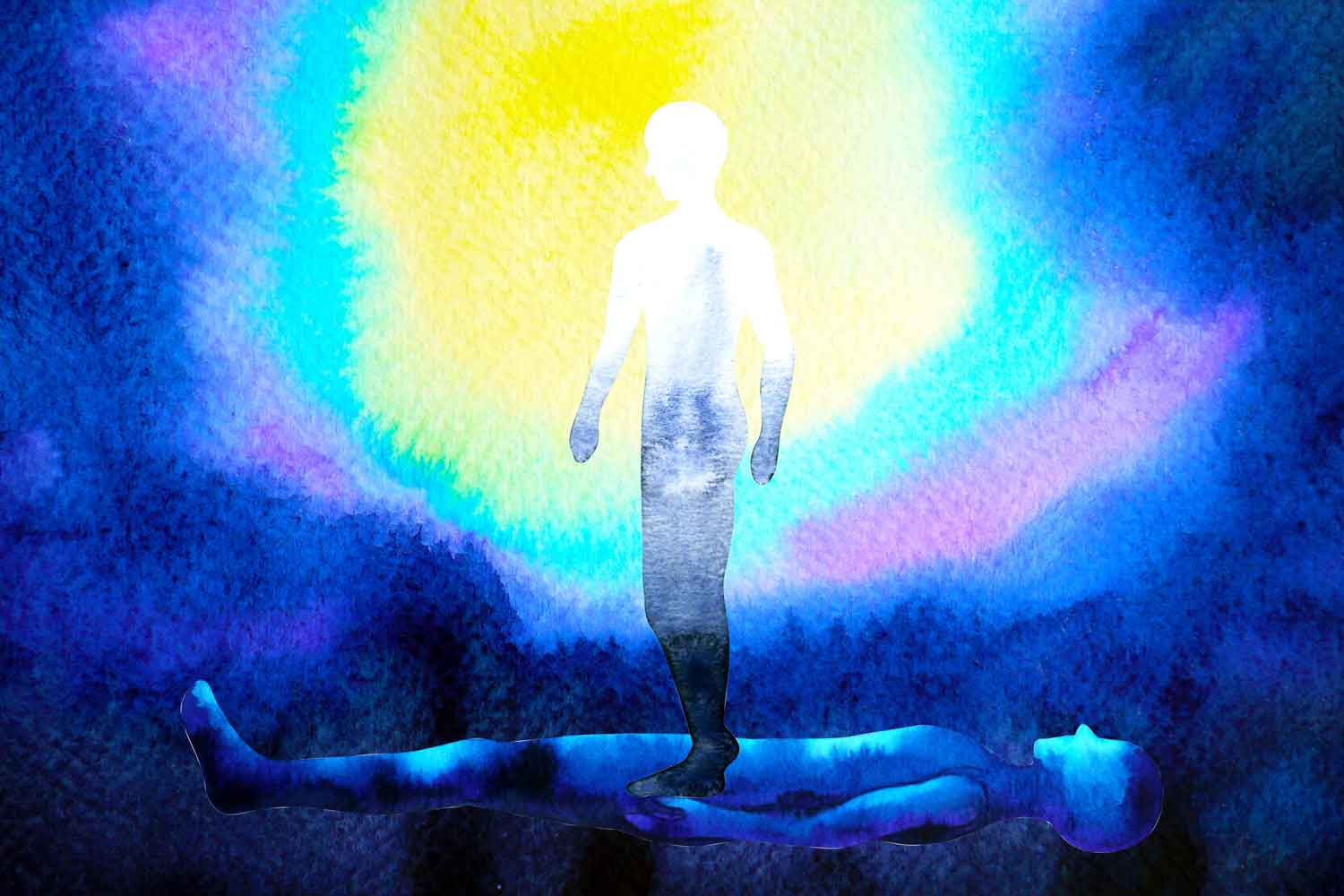
Looking back, 2015 was a banner year for me. It started with a breakup and became masked in a fog of depression that only cleared when I was snorting cocaine. (Things get better, promise.) I was 32 and addicted, driven by a desire to make it. I had everything I was supposed to want: the badass career, the six-figure salary, the weekend home. But I see now that my happiness was conditional – I was always just a setback away from spiralling out of control. When things ended with the girlfriend I thought I’d marry, I plunged into darkness. Truthfully, I wanted to kill myself, but my father had done that and I’d never aspired to be like him.
I was looking for a way out of the city, so I made plans to visit my mother and stepfather. They’re classic new-age baby boomers. They have the crystals, the flowing clothes, the angel artwork. I thought they were crazy for most of my young life.
Yet they’d somehow persuaded me, in my hapless state, to sit for a session with their friend Linda. Old enough to be my grandmother, she did some sort of metaphysical work. She called it life planning. I didn’t see how a meeting with her could help me, but I was desperate. I’d tried getting clean. I’d tried therapy. I’d tried the 12 steps. But I’d baulked at them all. I was afraid of changing, but I knew I couldn’t go back, either. I sent along info she’d requested and booked a plane ticket.
Open your mind to possible new perspectives . . . the informational pamphlet Linda mailed me read. Life planning gifts you with higher levels of knowing, evoking clear insight into your potential, your evolutionary path, your purpose . . .
At the very least, I’d get some sun. In early November, my mother drove me to Linda’s apartment.
“All of this is you,” Linda told me as she sat at her dining-room table. In front of her were three pieces of paper covered in scribbles, numbers and something that looked like a wheel. “When it’s all united, working in unison, you’ve got a perfect existence, in terms of the plan.”
“What plan?” I asked.
“Your soul’s plan.”
What Linda revealed to me over the next two hours would slowly begin to transform my life, but on that first afternoon, it sounded totally fucking crazy – like it probably sounds to you right now.
Linda’s message isn’t unique. In the past, you had to travel to an ashram in India or a holistic retreat in the Byron Bay hinterland to acquire the wisdom of mystic folks, but it’s 2019, the Internet is alive and well, and thanks to some very famous advocates, soul therapy has reached the mainstream.
Oprah Winfrey is essentially the godmother of the movement. Her podcast, Oprah’s SuperSoul Conversations, features successful people – Bradley Cooper, Alanis Morissette, Sebastian Junger, Eckhart Tolle, Elizabeth Gilbert – talking about how they learned to quiet their egos and get down to the business of listening to their souls. And if you’re thinking, “Of course Oprah has a woowoo show about finding your life’s purpose”, then turn on any podcast helmed by a semiwoke bro and you’ll stumble on the likes of Joe Rogan and Russell Brand dissecting myriad ideas that boil down to versions of the same big question: “What the hell are we doing here?”
This rabid search for meaning in modern life finds us turning to new territory. The unexplainable. The unquantifiable. It’s why venture capitalists have pinpointed astrology as the next big investment, with horoscopedriven apps like Co-Star and The Pattern on the road to rivaling titans Spotify and Tinder. It’s why yoga studios pop up in old warehouses and why more and more Aussies are dabbling in spirituality in a way we haven’t seen since the ’60s. It’s why celebrated food journalist Michael Pollan just wrote a best-selling book about the holistic benefits of psychedelic drugs, and why Rogan’s trippy podcast is downloaded nearly 20 million times per month.
We’re living in a time of shattered illusions and soul-crushing truths. Divided politics reigns. Economic crisis looms. #MeToo landed like a Mayweather uppercut. Because we’re all fairly sure that the answer to our anxiety does not lie in more money, more sex or more muscles, we’re looking somewhere else: within ourselves.
Following our soul’s plan is the proverbial hero’s journey, says Onnit CEO, author and podcast host Aubrey Marcus. It’s what Joseph Campbell meant when he wrote, “We must let go of the life we have planned, so as to accept the one that is waiting for us.”
Marcus, whose health-first approach functions as a kind of Trojan-horse spirituality for biohackers and gym rats – he extols the benefits of ayahuasca, cold exposure and ecstatic dance, among other modalities– tells me he believes the term soul is too loaded to use responsibly and has too many religious implications. He prefers to refer to our “true calling”, or our “awareness”.
“We all have a calling from when we were little kids,” Marcus says. “What we think we want to do with our lives. But after a while, we kind of accept our compromises. We distract ourselves, intoxicate ourselves, placate ourselves. Most of us don’t ever take the time to get still and listen to our awareness.”
To find that stillness, Marcus suggests trying spiritual practices like yoga and meditation or spending time in nature, but most of all: getting quiet. “Put your phone in a drawer for two days and don’t talk to anyone,” he says. “Just be with yourself.”
So why aren’t we all getting quiet and following our souls? It turns out that’s a pretty complicated question.
Former NYU professor and playwright Paul Selig, who works with what he calls “spirit guides” that teach classes and workshops and even channel entire books through him (now six in total, including the popular I Am the Word), has an answer: “Realisation comes at the cost of the old”, The problem, Selig says, is that people want to be fixed. They want the easy answer – X, Y, and Z. And the reality is that aligning with our souls after a life spent doing everything to avoid ourselves can be agonising. But, he says, it’s worth it. For 25 years, he wrestled with the decision to give up his academic life, but in the end, his calling won out. “It might have been easier to live the life I was expected to live, because it wouldn’t have challenged me beyond my comfort zone. So the risk I took was to say ‘yes’.”
For most of us, however, finding our true calling isn’t as simple as downloading psychic messages or dropping by a Buddhist temple. We toil away at jobs we don’t love, and we are frustrated by personal lives that are lacking.
That’s when it pays to call a professional, like psychic Ainslie MacLeod, author of the book The Instruction: Living the Life Your Soul Intended. MacLeod, who is currently making the podcast rounds, is considered the rock-star psychic of the moment.
“What unites my clients is a search for meaning,” MacLeod tells me. “What they thought was working has stopped working. They went through college and got a job, got married, and they thought that was the be-all, end-all. Their soul wants something more.”
His method of soul counselling also comes through “spirit guides” – voices from the other side that provide information like the age and type of a person’s soul. But an appointment with MacLeod is more like a conference call than a séance. You dial the call-in number and there he is, with precise knowledge about your life that can help you identify your purpose. When I called, he described my experience exactly. MacLeod says his work can help empower clients to take a leap of faith by understanding that they’re not victims, that they have the power to go for what is often right in front of them. “Who you are is why you’re here,” he says.
MacLeod is right. As a result of that frantic quest for meaning, astrologers like Susan Miller and Chani Nicholas have catapulted to near-movie-star levels of fame, with fans lustily devouring their forecasts on the first of each month and Gwyneth Paltrow’s wellness brand, Goop – which hawks essentially designer spirituality – is valued at $250 million. As old systems crumble and the world seemingly implodes around us, we desperately want to believe in something. And soul therapy – the idea that a part of us is connected to something larger – provides hope.
Who you are is why you’re here. I had to let that digest a little. Linda had explained to me during our session that I needed to experience tragedy at a young age so that I could learn to heal, as healing work was my soul’s calling.
After two hours of Linda walking me through my soul’s contract, my “Tree of Life” (the states of consciousness I’d use to access the contract), and my astrological chart (which I’d use to work through the contract), I returned home more confused than when I’d left.
A few months later, after another riotous bender, I lay awake in bed again, pondering my existence. I wanted to die. Then I thought of Linda. What if I gave her soul plan an honest go? What did I have to lose?
Bolstered by a second listen to our session, which Linda had sent me on two CDs, I got myself into intensive group therapy, where I launched into the gutting emotional work that I’d been avoiding. It was equal parts excruciating and exhilarating to parse my grief. I consumed spiritual books and feverishly wrote down every memory, every insight, trying to get to the bottom of myself. The thrill of living my own myth replaced any trepidation about what I’d left behind.
I found the quiet I was searching for. I said goodbye to my father on a mountaintop and to an on-again-off-again ex on the phone. Finally, in the spring of 2016, I returned to my hometown for a reunion with my family whom I’d ghosted after my dad’s death. With each restored connection, I felt more whole. I was healing. I had bought the ticket and I was taking the ride, wherever it was leading.
Two years later I’m sober. I have a deeply renewed relationship with my family. And this month, I begin studying to become a therapist. Was it my soul’s plan? I’ll never know. But Linda’s plan did save me, if only from myself.


















